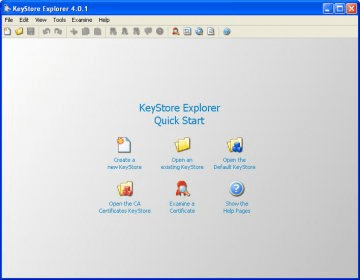
Obtaining an instance of a KeyStore is done via the static getInstance method on the KeyStore class. See the Java Cryptography Architecture specification for more information on the JCA. insertProviderAt ( new MyProvider ( ), 1 ) Providers can also be registered dynamically, like so: When registered declaratively, the implementation of the Provider class must be visible to the extension classloader ( %JRE_HOME%\lib\ext) or lower (i.e.: on the boot classpath). # List of providers and their preference orders (see above): Providers maintain their list of supported algorithm types internally, and can be registered into the system declaratively in %JRE_HOME%\lib\security by classname like so:


The algorithms supported are each of a specific type, for example “KeyStore.JKS“ or “KeyStore.PKCS12”. The Provider class is responsible for maintaining an internal list of supported algorithms that is supports, of which KeyStore is one example. The method of installing KeyStores into the system is the Java Cryptography Architecture (JCA), which relies on installing and accessing implementations of via the class.
INSTALL KEYSTORE EXPLORER PASSWORD
For validating a password for login to the Platform.Passwords for connecting to CVS (via PBEKey).When needed for SSL client authentication.When installing and loading signed classes from bundles.As a repository for Certificates used for trust decisions:.There are several usages for the KeyStore in Eclipse: Other options include Smartcards, or network based repositories. This store can be backed by a flat file (as with the default Java KeyStore - "JKS"), an encrypted file (as with the JCE KeyStore - "JCEKS") or common file formats like PKCS12. This API provides methods for getting and setting implementations of the and into an abstract storage repository. In Java, the interface that abstracts these concepts is the. One of the first enhancements required is the ability to manage the user's keys and trusted certificates.

On the path to enabling code-signer based security in Eclipse via enabling the Java SecurityManager, several infrastructure improvements must be implemented in both the RCP and the IDE.


 0 kommentar(er)
0 kommentar(er)
